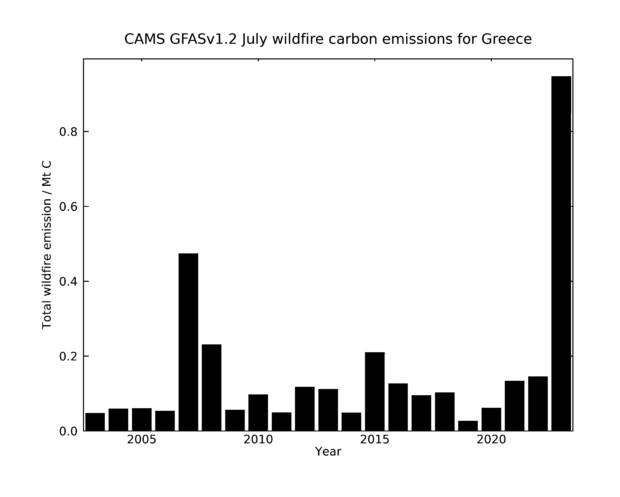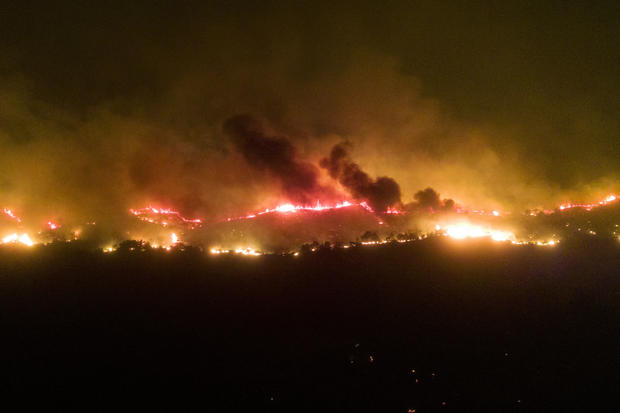Greece wildfires are so intense they've spewed more emissions in a week than July wildfires in 2 decades
Wildfires have been running rampant across Greece for weeks now, forcing thousands of locals and tourists to evacuate popular sites across multiple islands. The fires have been so intense, new data shows that they have released more carbon in just over a week than wildfires have in any July in more than 20 years.
The ongoing wildfires burn as yet another heat wave hits the nation, putting many areas in temperatures above 104 degrees Fahrenheit. Several islands, including Corfu and Evia, have seen evacuations, as Rhodes is experiencing wildfires that have torched part of a nature reserve and led to more than 20,000 people evacuated – the largest-ever wildfire evacuation in the country.
And, the fires are affecting air quality. Data gathered by Copernicus, the European Union's climate change and earth observation service, shows that Greece has had its highest wildfire carbon emissions in July ever recorded, "by a very large margin."
More than 1 megatonne, or 1 million metric tons, of carbon has been emitted from July 1 through July 25, the service said. That amount is roughly double the July emissions record set in 2007. In 2020, Greece emitted 48 megatonnes of carbon dioxide, according to International Energy Agency.
What's particularly notable is that the wildfires did not start their large-scale spread until just over a week ago, meaning it took just days to smash an emissions number not seen in 16 years.
"Unfortunately, it is not all that surprising, given the extreme conditions in the region," CAMS senior scientist Mark Parrington said. "The observed intensity and estimated emissions show how unusual the scale of the fires have been for July relative to the last 20 years of data that we have from our Global Fire Assimilation System."
Wildfires emit carbon dioxide, a greenhouse gas that traps heat within the atmosphere. Carbon dioxide emissions are a major driver of climate change, an impact that then creates fuel for more wildfires as drought and extreme heat escalate.
"Forests in particular store large amounts of carbon," the EPA says. "When they burn, they immediately release carbon dioxide into the atmosphere, which in turn contributes to climate change. After burning, forests also release carbon dioxide more gradually through decomposition."
The total fire radiative power – the heat and energy released by the burning vegetation — was below the daily 20-year average up until July 14. At that point, it was above average for two days, before taking a dip on the 16th, and then seeing a major spike on July 17 when massive fires erupted across the country. The fire power seemed to peak on July 18 at a level roughly 10 times more than the 20-year average for that day.
The fires have burned more land so far this year than the annual average. More than 48,000 hectares, or nearly 186 square miles of land, have been burned so far this year, according to Copernicus data. The annual average since 2006 is just under 168 square miles.
The Rhodes fire is so massive that it was clearly visible on a satellite "not designed to capture such events, but the larger atmospheric conditions," Copernicus said.
And the emissions and damage from the fires aren't over yet. Greece and much of the Mediterranean are still experiencing a severe heat wave, a major driver of wildfires.
"Our data also shows that the previous highest years (in 2007 and 2021) occurred under heatwave conditions with more fires in August," Parrington said, "and we will continue monitoring very closely fire emissions in Greece and around the Mediterranean until the end of the summer."





